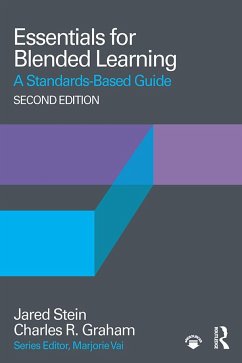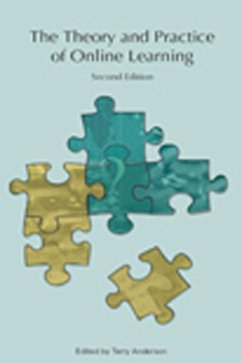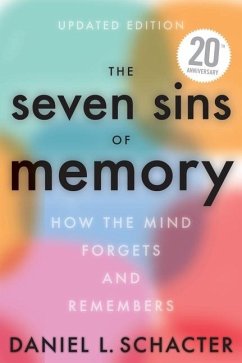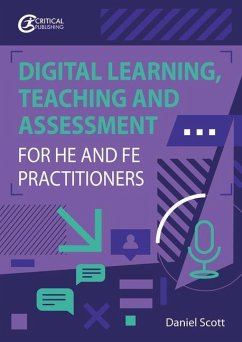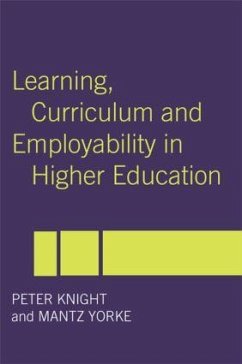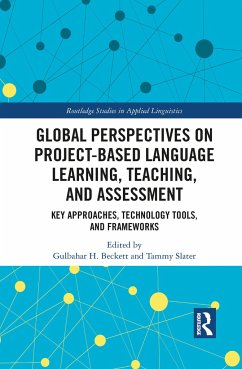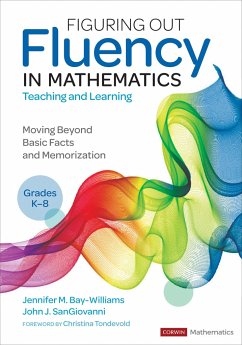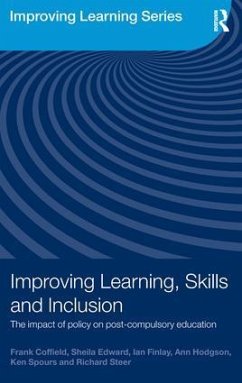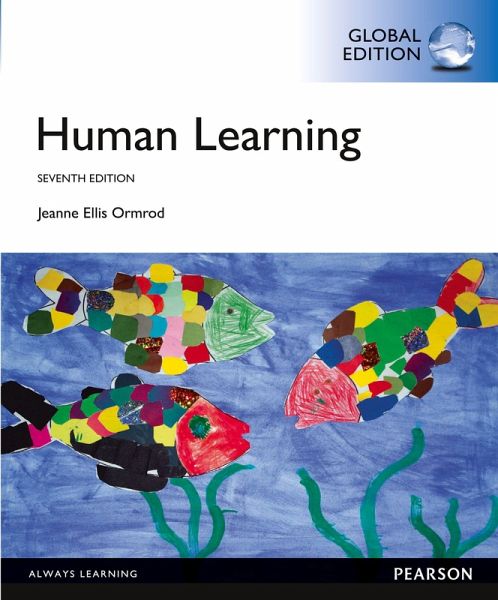
Human Learning, Global Edition

PAYBACK Punkte
27 °P sammeln!
For courses in Learning Theory / Cognition and Instruction / Educational Psychology
The market-leading text on learning theories applied to education, this book draws readers in with a lucid and engaging writing style. It covers a broad range of theoretical perspectives, while including numerous classroom examples of how these theories apply to learning, instruction, and assessment.
The market-leading education textbook on learning theories, Human Learning looks at a broad range of theoretical perspectives, including behaviorist, social cognitive, cognitive, constructivist, contextual, and developmental theories. It describes associationistic processes, such as classical and operant conditioning, as well as more complex and distinctly human processes such as metacognition, self-regulated learning, and critical thinking. Using a many concrete examples and specific classroom applications, plus a lucid, conversational writing style that truly speaks to students, the author engages students from the start, and makes the concepts, principles, and theories related to human learning and cognition meaningful. The new Seventh Edition features a condensed format, which ideally accommodates typical semester-long courses, coverage of a variety of new topics that have emerged in recent research, and significant updates to include such information as technological innovations in instruction and the neurological underpinnings of learning and behavior.
Features + Benefits
This title is a Pearson Global Edition. The Editorial team at Pearson has worked closely with educators around the world to include content which is especially relevant to students outside the United States.
Engage students in learning from the start. The text’s hallmark conversational writing style makes readers feel like the author is speaking directly to them. It draws students into the concepts. (Open to any page in the text and start reading to find examples.)
Introduce students to all of the essential learning theories. The work covers a wide array of theories, including: behaviorist, social cognitive, cognitive, contextual, and developmental theories. Additionally, associationistic processes are described (e.g. classical and instrumental conditioning), as well as more complex and distinctly human processes (e.g. metacognition, self-regulated learning, critical thinking. (See the brief table of contents on page ix.)
Help students understand how to use learning theory in their instructional practice. Written with teachers and other practitioners in mind, every chapter includes teaching implications for real-world professional practice. Readers learn how to apply theories and research findings to their own decision making as teachers, counselors, and other practitioners. (See pages 265-271 and 296-300 for examples.)
NEW! Condensed from 17 to 15 chapters, the text now ideally accommodates typical semester-long courses.
NEW! Expanded discussion of contextual views of learning (e.g. communities of practice, Bronfenbrenner’s ecological systems theory) helps readers understand the broader social and cultural contexts that affect learning either directly or indirectly. (See pages 321-326.)
NEW! Expanded discussion of how assessment practices have direct and/or indirect effects on students’ learning now includes backward design, use of rubrics, and use of Common Core and other content-area standards. (See pages 98-102 for an example.)
NEW! Introduction of the term cognitive load as an important consideration in instructional design and practice cautions readers against overwhelming students with more information than they can possibly handle at any single time. (In Chapter 7 (pp. 187-188), but also in Chapters 8, 10, 11, and 13)
NEW! Increased coverage of technology throughout the book presents the new opportunities and challenges that technology offers to learners and instructors. For example Chapter 5 discusses how self-videos are being used to help students self-regulate. (See page 187 for an example.) Chapter 13 looks at technology-based supports for learning, such as intelligent tutors; and more. (See pages 413 and 415-416 for examples.)
PART ONE INTRODUCTION TO HUMAN LEARNING
CHAPTER 1 Perspectives on Learning
CHAPTER 2 Learning and the Brain
PART TWO BEHAVIORIST VIEWS OF LEARNING
CHAPTER 3 Behaviorist Principles and Theories
CHAPTER 4 Applications of Behaviorist Principles
PART THREE SOCIAL COGNITIVE THEORY
CHAPTER 5 Social Cognitive Theory
PART FOUR COGNITIVE VIEWS OF LEARNING
CHAPTER 6 Introduction to Cognitivism
CHAPTER 7 Basic Components of Memory
CHAPTER 8 Long-Term Memory Storage and Retrieval Processes
CHAPTER 9 The Nature of Knowledge
PART FIVE DEVELOPMENTAL AND CONTEXTUAL PERSPECTIVES
CHAPTER 10 Cognitive-Developmental Perspectives
CHAPTER 11 Sociocultural Theory and Other Contextual Perspectives
PART SIX COMPLEX LEARNING AND COGNITION
CHAPTER 12 Metacognition, Self-Regulated Learning, and Study Strategies
CHAPTER 13 Transfer, Problem Solving, and Critical Thinking
PART SEVEN MOTIVATION
CHAPTER 14 Motivation and Affect
CHAPTER 15 Cognitive Factors in Motivation
The market-leading text on learning theories applied to education, this book draws readers in with a lucid and engaging writing style. It covers a broad range of theoretical perspectives, while including numerous classroom examples of how these theories apply to learning, instruction, and assessment.
The market-leading education textbook on learning theories, Human Learning looks at a broad range of theoretical perspectives, including behaviorist, social cognitive, cognitive, constructivist, contextual, and developmental theories. It describes associationistic processes, such as classical and operant conditioning, as well as more complex and distinctly human processes such as metacognition, self-regulated learning, and critical thinking. Using a many concrete examples and specific classroom applications, plus a lucid, conversational writing style that truly speaks to students, the author engages students from the start, and makes the concepts, principles, and theories related to human learning and cognition meaningful. The new Seventh Edition features a condensed format, which ideally accommodates typical semester-long courses, coverage of a variety of new topics that have emerged in recent research, and significant updates to include such information as technological innovations in instruction and the neurological underpinnings of learning and behavior.
Features + Benefits
This title is a Pearson Global Edition. The Editorial team at Pearson has worked closely with educators around the world to include content which is especially relevant to students outside the United States.
Engage students in learning from the start. The text’s hallmark conversational writing style makes readers feel like the author is speaking directly to them. It draws students into the concepts. (Open to any page in the text and start reading to find examples.)
Introduce students to all of the essential learning theories. The work covers a wide array of theories, including: behaviorist, social cognitive, cognitive, contextual, and developmental theories. Additionally, associationistic processes are described (e.g. classical and instrumental conditioning), as well as more complex and distinctly human processes (e.g. metacognition, self-regulated learning, critical thinking. (See the brief table of contents on page ix.)
Help students understand how to use learning theory in their instructional practice. Written with teachers and other practitioners in mind, every chapter includes teaching implications for real-world professional practice. Readers learn how to apply theories and research findings to their own decision making as teachers, counselors, and other practitioners. (See pages 265-271 and 296-300 for examples.)
NEW! Condensed from 17 to 15 chapters, the text now ideally accommodates typical semester-long courses.
NEW! Expanded discussion of contextual views of learning (e.g. communities of practice, Bronfenbrenner’s ecological systems theory) helps readers understand the broader social and cultural contexts that affect learning either directly or indirectly. (See pages 321-326.)
NEW! Expanded discussion of how assessment practices have direct and/or indirect effects on students’ learning now includes backward design, use of rubrics, and use of Common Core and other content-area standards. (See pages 98-102 for an example.)
NEW! Introduction of the term cognitive load as an important consideration in instructional design and practice cautions readers against overwhelming students with more information than they can possibly handle at any single time. (In Chapter 7 (pp. 187-188), but also in Chapters 8, 10, 11, and 13)
NEW! Increased coverage of technology throughout the book presents the new opportunities and challenges that technology offers to learners and instructors. For example Chapter 5 discusses how self-videos are being used to help students self-regulate. (See page 187 for an example.) Chapter 13 looks at technology-based supports for learning, such as intelligent tutors; and more. (See pages 413 and 415-416 for examples.)
PART ONE INTRODUCTION TO HUMAN LEARNING
CHAPTER 1 Perspectives on Learning
CHAPTER 2 Learning and the Brain
PART TWO BEHAVIORIST VIEWS OF LEARNING
CHAPTER 3 Behaviorist Principles and Theories
CHAPTER 4 Applications of Behaviorist Principles
PART THREE SOCIAL COGNITIVE THEORY
CHAPTER 5 Social Cognitive Theory
PART FOUR COGNITIVE VIEWS OF LEARNING
CHAPTER 6 Introduction to Cognitivism
CHAPTER 7 Basic Components of Memory
CHAPTER 8 Long-Term Memory Storage and Retrieval Processes
CHAPTER 9 The Nature of Knowledge
PART FIVE DEVELOPMENTAL AND CONTEXTUAL PERSPECTIVES
CHAPTER 10 Cognitive-Developmental Perspectives
CHAPTER 11 Sociocultural Theory and Other Contextual Perspectives
PART SIX COMPLEX LEARNING AND COGNITION
CHAPTER 12 Metacognition, Self-Regulated Learning, and Study Strategies
CHAPTER 13 Transfer, Problem Solving, and Critical Thinking
PART SEVEN MOTIVATION
CHAPTER 14 Motivation and Affect
CHAPTER 15 Cognitive Factors in Motivation
For courses in Learning Theory / Cognition and Instruction / Educational PsychologyThe market-leading text on learning theories applied to education, this book draws readers in with a lucid and engaging writing style. It covers a broad range of theoretical perspectives, while including numerous classroom examples of how these theories apply to learning, instruction, and assessment.The market-leading education textbook on learning theories, Human Learning looks at a broad range of theoretical perspectives, including behaviorist, social cognitive, cognitive, constructivist, contextual, and developmental theories. It describes associationistic processes, such as classical and operant conditioning, as well as more complex and distinctly human processes such as metacognition, self-regulated learning, and critical thinking. Using a many concrete examples and specific classroom applications, plus a lucid, conversational writing style that truly speaks to students, the author engages students from the start, and makes the concepts, principles, and theories related to human learning and cognition meaningful. The new 7th Edition features a condensed format, which ideally accommodates typical semester-long courses, coverage of a variety of new topics that have emerged in recent research, and significant updates to include such information as technological innovations in instruction and the neurological underpinnings of learning and behaviour.




